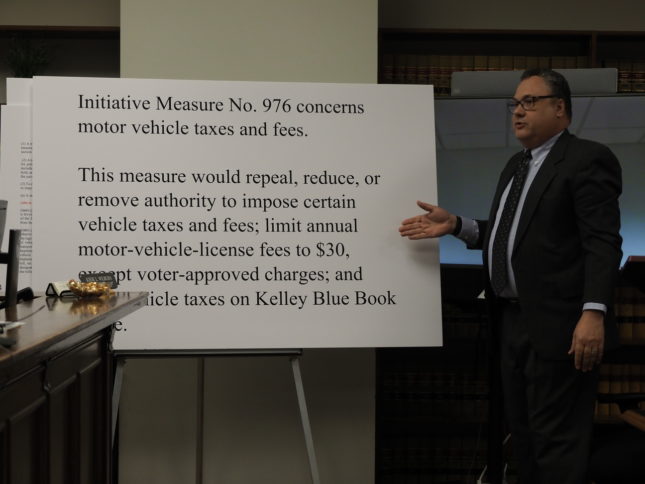February 7th, 2020
Initiative 976 court challenge oral argument on summary judgment: A primer
In the CourtsRethinking and Reframing
This morning, King County Superior Court Judge Marshall Ferguson is once again hearing oral arguments in Garfield County et al v. State of Washington et al, the legal challenge to Tim Eyman’s Initiative 976, which the Garfield County Transportation Authority and other plaintiffs (including intervenor plaintiffs) contend is unconstitutional.
Initiative 976 is the destructive and deceptive measure sponsored by Eyman that Washington voters saw on their ballots last autumn, which falsely advertised the prospect of “thirty dollar car tabs” in its ballot title, with no consequences mentioned whatsoever.
I-976 was adopted with the support of a submajority of voters; 23.44% of Washingtonians registered to vote voted yes on I-976, while the remainder did not vote or voted no.
Turnout in the 2019 Washington State general election ended up at 45.19%, it was the seventh worst general election turnout in state history.
Like bills, initiatives proposed to the people must comply with all of the provisions of the Washington State Constitution. The plaintiffs in this case allege that Initiative 976 has eleven different constitutional defects.
A list of those defects is available in this post on the Cascadia Advocate.
Some of the alleged defects, if proven by the plaintiffs, would result in the invalidation of the initiative in its entirety.
For example, when a measure runs afoul of the Constitution’s anti-logrolling provision, severability does not apply and all provisions get voided.
In the words of the plaintiffs:
“I-976 had a deceptive ballot title that mislead the voters. It lied about ensuring car tabs would be $30. It combined multiple unrelated subjects to cobble together enough support to get the measure passed, a classic unconstitutional log-rolling guise. I-976 fails to set forth all statutes it amends rendering its application confusing.”
“It intrudes on local home rule powers of taxation for local purposes, seeks to over-turn local election results, and requires diversion of locally approved taxes. I-976 impairs contract obligations by seeking to eliminate Burien’s vehicle license fee that have been pledged to secure its bonds. Each of these matters are constitutional violations requiring that I-976 be struck down,” the plaintiffs’ motion for summary judgment concludes.

Because I-976 is already on hold thanks to an earlier ruling by Judge Ferguson in November, today’s hearing concerns the parties’ cross motions for summary judgment.
The plaintiffs are asking that Judge Ferguson find I-976 unconstitutional and strike it down; the defendants are asking that I-976 be upheld.
The initiative’s defense, in accordance with state law, is the responsibility of Attorney General Bob Ferguson, because it was passed by voters.
However, several parties have intervened in the case, so there will be many entities making arguments before Judge Ferguson at today’s hearing.
Q&A: Background on the I-976 legal challenge
What is the challenge about and why was it brought?
This case was brought to protect Washington State from the destructive ramifications that implementation of Initiative 976 would entail, and to defend the Washington State Constitution from I-976. I-976 threatens essential funding for multimodal transportation projects at three levels: state, regional, and local.
At the outset of the case, the plaintiffs had two objectives:
- To temporarily prevent Initiative 976 from taking effect on December 5th, 2019 (as scheduled) and immediately depriving cities and transit agencies all over Washington State from revenue needed to ensure freedom of mobility
- To permanently prevent Initiative 976 from taking effect by obtaining a declaratory judgment finding it unconstitutional on one or more grounds.
The plaintiffs succeeded in securing their first objective last year, when they persuaded Judge Marshall Ferguson to grant an injunction barring the implementation and enforcement of I-976, an order that was subsequently upheld on appeal. The plaintiffs are now asking Judge Ferguson to issue a declaratory judgment finding I-976 unconstitutional.
Who are the parties in the case?
GARFIELD COUNTY TRANSPORTATION AUTHORITY; KING COUNTY; CITY OF SEATTLE; WASHINGTON STATE TRANSIT ASSOCIATION; ASSOCIATION OF WASHINGTON CITIES; PORT OF SEATTLE; INTERCITY TRANSIT; AMALGAMATED TRANSIT UNION LEGISLATIVE COUNCIL OF WASHINGTON; and MICHAEL ROGERS,
Plaintiffs,
and
WASHINGTON ADAPT; TRANSIT RIDERS UNION; and CLIMATE SOLUTIONS,
Intervenor-Plaintiffs,
v.
STATE OF WASHINGTON,
Defendant,
and
CLINT DIDIER; PERMANENT OFFENSE, TIMOTHY D. EYMAN, MICHAEL FAGAN; JACK FAGAN; and PIERCE COUNTY,
Intervenor-Defendants.
What happens after oral argument?
Judge Ferguson will consider each party’s arguments and rule on the cross motions for summary judgment. Whichever way he rules, his decision will almost certainly be appealed to the Washington State Supreme Court. A common adage among lawyers is that ninety percent of a case comes down to written briefs. So while today’s oral argument provides an opportunity for the judge to hear from the parties’ attorneys, the judge has already seen hundreds of pages of arguments and supporting documentation from the parties. NPI has copies of these materials and can provide them upon request.
When will the judge rule?
Judge Ferguson indicated this morning in his welcoming remarks to counsel and to the public that he plans to rule early next week, but cautioned he may choose to take more time to develop his ruling. He has set aside all of today for oral argument.
Didn’t the State Supreme Court already issue a ruling in this case?
Yes, but that ruling only concerned the injunction that Judge Ferguson ordered temporarily barring I-976 from going into effect. Attorney General Bob Ferguson requested that the Supreme Court overturn the injunction; a majority of the justices declined that request. I-976 will soon return before the Court for a final determination of its constitutionality. If the justices agree that the plaintiffs have proved I-976 unconstitutional beyond a reasonable doubt, it will not go into effect.
This isn’t the first Eyman initiative to face a legal challenge. How many Tim Eyman initiatives have previously been struck down as unconstitutional?
Seven if you don’t count Initiative 776, which was partially neutralized in Pierce County II.
- Initiative 695 (1999; vehicle fees)
- Initiative 722 (2000; property taxes)
- Initiative 747 (2001; property taxes)
- Initiatives 960, 1053, 1185 (2007, 2010, 2012; thresholds for passage of revenue bills)
- Initiative 1366 (2015; attempted extortion to re-implement I-960/I-1053/I-1185)



